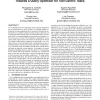Free Online Productivity Tools
i2Speak
i2Symbol
i2OCR
iTex2Img
iWeb2Print
iWeb2Shot
i2Type
iPdf2Split
iPdf2Merge
i2Bopomofo
i2Arabic
i2Style
i2Image
i2PDF
iLatex2Rtf
Sci2ools
SIGMOD
2006
ACM
2006
ACM
To search or to crawl?: towards a query optimizer for text-centric tasks
Text is ubiquitous and, not surprisingly, many important applications rely on textual data for a variety of tasks. As a notable example, information extraction applications derive structured relations from unstructured text; as another example, focused crawlers explore the web to locate pages about specific topics. Execution plans for text-centric tasks follow two general paradigms for processing a text database: either we can scan, or "crawl," the text database or, alternatively, we can exploit search engine indexes and retrieve the documents of interest via carefully crafted queries constructed in task-specific ways. The choice between crawl- and query-based execution plans can have a substantial impact on both execution time and output "completeness" (e.g., in terms of recall). Nevertheless, this choice is typically ad-hoc and based on heuristics or plain intuition. In this paper, we present fundamental building blocks to make the choice of execution plans for t...
Appropriate Execution Plans | Database | Execution Plans | Query-based Execution Plans | SIGMOD 2006 |
| Added | 08 Dec 2009 |
| Updated | 08 Dec 2009 |
| Type | Conference |
| Year | 2006 |
| Where | SIGMOD |
| Authors | Panagiotis G. Ipeirotis, Eugene Agichtein, Pranay Jain, Luis Gravano |
Comments (0)

